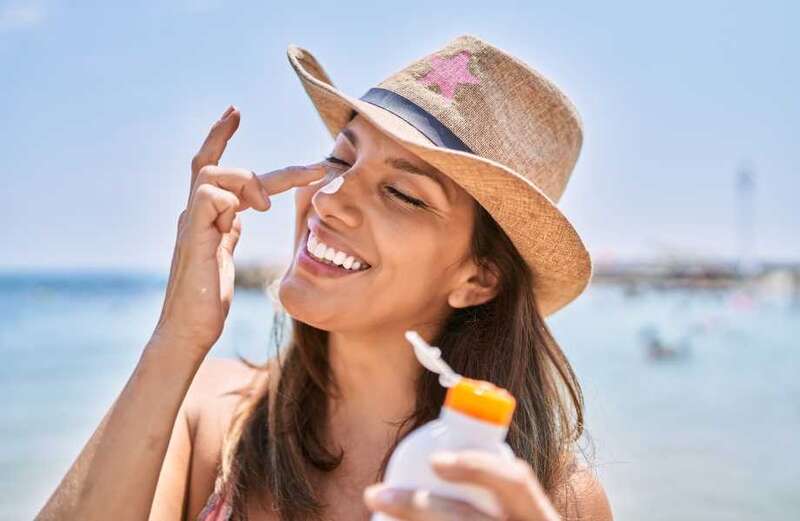SUNSCREEN is essential in helping to prevent skin cancer and the signs of ageing — but what's the best lotion on the market?
Here we investigate whether cheaper brands offer the same protection as their high-end counterparts.

Why is sunscreen so expensive?
One of the main reasons sunscreen can be so pricey is because of the high-quality ingredients and sophisticated formulations required for producing effective sun protection.
Manufacturers have to invest in ingredient sourcing, procuring components that meet strict safety and efficacy standards, in order to create a product capable of shielding your skin from harmful UV rays.
This involves finding reliable suppliers and making sure the raw materials are pure, potent and — for some brands at least — environmentally friendly.
 Are there illegal baby names? Surprising monikers that are BANNED in other countries, from Sarah to Thomas
Are there illegal baby names? Surprising monikers that are BANNED in other countries, from Sarah to Thomas
As consumer preferences evolve and new information about sun protection needs becomes available, companies continuously strive for formulation innovation, such as products with unique textures and improved water resistance — all the while maintaining strong UVA and UVB filters.
How expensive should sunscreen be?
Sunscreen ranges in price from a few quid to a few hundred — Noble Panacea's Multi-Defence SPF 50 will set you back a whopping £312.
Although it would be logical to think pricier SPF offers better protection, it isn't always the case.
Which?'s Natalie Hitchins said: “We’ve found plenty of highly effective, cheap sunscreens available on the high street, so there’s no need to splash out to keep you and your loved ones safe in the sun.”
What's the difference between cheap and expensive SPF?
The main difference between cheap and expensive SPF is the price.
Active ingredients in different sunscreens are very similar no matter how much they set you back.
Sunscreens work by using physical blockers — sometimes called sunblock — that protect you from harmful UV rays by acting like a shield or mirror, or by utilising chemical absorbers, which form a thin protective film that absorbs UV radiation before it penetrates the skin.
Dermatologist Dr Brendan Camp told HuffPost: “There are only a certain number of FDA-approved active ingredients in sunscreens, so there are bound to be similarities across products.
“Variations may occur in the vehicle, such as being oil-free or including ingredients that offer additional skin health benefits.”
Is expensive sunscreen worth it?
In short, it depends — some premium brands offer the protection promised, but then again so do some budget alternatives.
 All about Rachel Nickell who was murdered in front of her son Alex Hanscombe
All about Rachel Nickell who was murdered in front of her son Alex Hanscombe
Certain supermarket own-brand lotions costing as little as £3 even worked better than some of the expensive labels, according to consumer champion Which?.
Do not be fooled into thinking that paying a higher price will definitely mean a better or safer product
Natalie Hitchins
Tests carried out in June 2024 showed Asda’s factor 30 came out on top, while the same product made by Avon did not offer anywhere near the protection it claimed.
Hitchins said: “It is great to see cheaper sunscreens available on the high street at a time where consumers need affordable options.
“But it’s a concern to find a big brand product on the market that has failed our testing and did not offer the level of protection claimed on the packaging.”
According to the Skin Cancer Foundation, suffering at least five sunburns in your life can double your risk of melanoma — a deadly skin cancer.

The NHS recommends adults use at least factor 30 sunscreen and spend time in the shade between 11am and 3pm from March to October in the UK.
The Which? safety tests looked at how much protection SPF30 sunscreens really offered, while also assessing how well they absorbed into the skin.
They showed Asda’s £3 Protect Moisturising Sun Lotion SPF30 offers as much protection as it claims, without leaving sticky residue.
In contrast, Avon’s £5.75 Refreshing 3-in-1 Face and Body Sun Lotion SPF30 did not come close to hitting how much protection it’s advertised at.
Which? advised consumers to avoid the product, saying it did not offer adequate sun protection.

Louise Scott, chief scientific officer of Avon, said: “Our sun creams are tested by independent laboratories and Avon stands by the results that show this product has an SPF 30 rating.
“SPF testing by its nature is variable and whilst the Which? testing found this product to have a 26 SPF rating, we categorically dispute that people are putting themselves at risk by using this product.”
Larger brands like Ultrasun — which sells an SPF30 sunscreen at £22 — did offer as much protection as the Asda option, but were more greasy and left white marks.
Ms Hitchens said: “Our advice is to stick to a tried and tested suncream.
“Do not be fooled into thinking that paying a higher price will definitely mean a better or safer product, as our testing proved a supermarket own brand product can do the job well.



































